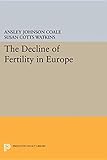The Decline of Fertility in Europe / Ansley Johnson Coale; ed. by Susan Cotts Watkins.
Material type: TextSeries: Office of Population Research ; 5138Publisher: Princeton, NJ : Princeton University Press, [2017]Copyright date: ©1986Description: 1 online resource (522 p.)Content type:
TextSeries: Office of Population Research ; 5138Publisher: Princeton, NJ : Princeton University Press, [2017]Copyright date: ©1986Description: 1 online resource (522 p.)Content type: - 9781400886692
- 304.6/32094 23
- HB991 .C66 2017eb
- online - DeGruyter
| Item type | Current library | Call number | URL | Status | Notes | Barcode | |
|---|---|---|---|---|---|---|---|
 eBook
eBook
|
Biblioteca "Angelicum" Pont. Univ. S.Tommaso d'Aquino Nuvola online | online - DeGruyter (Browse shelf(Opens below)) | Online access | Not for loan (Accesso limitato) | Accesso per gli utenti autorizzati / Access for authorized users | (dgr)9781400886692 |
Frontmatter -- Contents -- List of Participants -- List of Tables -- List of Figures -- List of Maps -- Preface -- Chapter 1. The Decline of Fertility in Europe since the Eighteenth Century As a Chapter in Demographic History -- Chapter 2. A Summary of the Changing Distribution of Overall Fertility, Marital Fertility, and the Proportion Married in the Provinces of Europe -- Chapter 3. Social-Group Forerunners of Fertility Control in Europe -- Chapter 4. Infant Mortality and the European Demographic Transition -- Chapter 5. Urban-Rural Differences in Fertility in Europe during the Demographic Transition -- Chapter 6. Modes of Production, Secularization, and the Pace of the Fertility Decline in Western Europe, 1870–1930 -- Chapter 7. Regional and Cultural Factors in the Decline of Marital Fertility in Europe -- Chapter 8. Regional Patterns of Nuptiality in Western Europe, 1870–1960 -- Chapter 9. Demographic Transitions in German Villages -- Chapter 10. Lessons from the Past: Policy Implications of Historical Fertility Studies -- Chapter 11. Conclusions -- References -- Index -- Maps
restricted access online access with authorization star
http://purl.org/coar/access_right/c_16ec
This volume summarizes the major findings of the Princeton European Fertility Project. The Project, begun in 1963, was a response to the realization that one of the great social revolutions of the last century, the remarkable decline in marital fertility in Europe, was still poorly understood.Originally published in 1986.The Princeton Legacy Library uses the latest print-on-demand technology to again make available previously out-of-print books from the distinguished backlist of Princeton University Press. These editions preserve the original texts of these important books while presenting them in durable paperback and hardcover editions. The goal of the Princeton Legacy Library is to vastly increase access to the rich scholarly heritage found in the thousands of books published by Princeton University Press since its founding in 1905.
Mode of access: Internet via World Wide Web.
In English.
Description based on online resource; title from PDF title page (publisher's Web site, viewed 30. Aug 2021)


